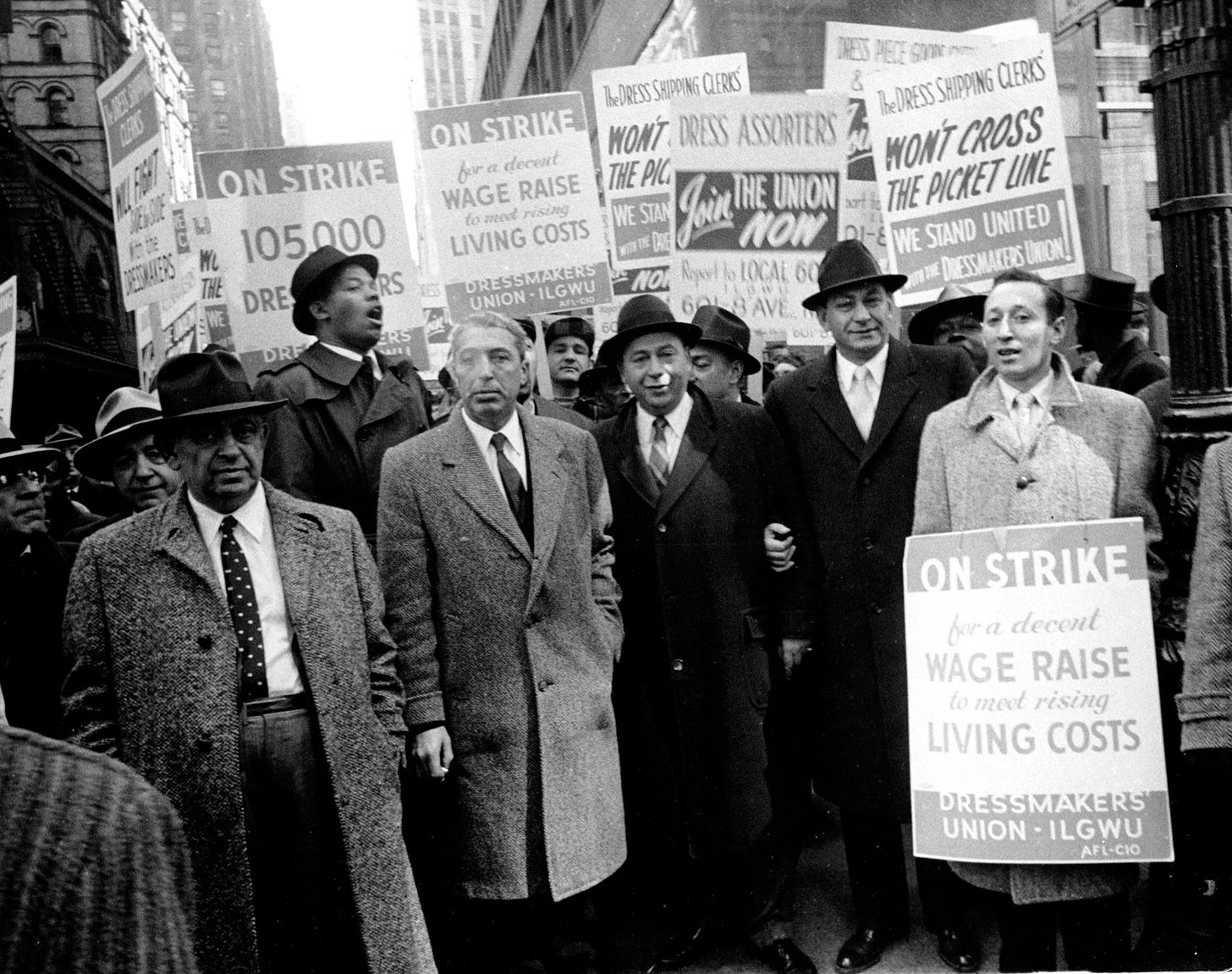The left needs a better story for men
Men are justifiably angry about the state of the world, and we need to acknowledge that.
We—those of us who stand against Trump and Musk and Zuckerberg and Bezos and the other billionaires sinking the government to profit from its wreckage—need a story for men that is better than the one the right is telling.
I’m really angry. These assholes are ripping people from our families and communities to deport them and making memes about it. They’re firing my friends in D.C. who’ve worked for the federal government for years. They’re gutting already-lackluster protections for workers. They’re selling oil and gas leases on public lands. They’re sharing AI-generated videos of Gaza rebuilt as a luxury resort with a massive gold Trump statue (yes, Trump just did that).
I’m also pissed at the Democratic Party for not figuring out how to beat these people. For taking billionaire campaign contributions themselves. For marginalizing progressive party members. For supporting and funding genocide in Gaza. For not standing for working people against the corporate execs and Wall Street banks who’ve been amassing growing mountains of wealth over my entire lifetime.
And that’s on top of the rage I was already feeling. We live in an exceptionally, heartbreakingly unequal society. Most of us have to work long hours at jobs that feel monotonous and meaningless. Most of us have to take orders from a boss. Most of us have to try to fit so much—adulting, haggling with health insurance companies, parenting—into the limited time we have outside of work. And we’re still barely scraping by, as the cost of housing and other basic needs (eggs!) keeps going up.
I recently read an article about “burner boys,” young migrants in Ghana who make cents an hour torching American electronics we send to developing countries once they stop working, causing them to cough up blood at night. In Indonesia, discarded plastic pours into the ocean at an estimated rate of 365 tons an hour. Plastic waste from countries like the U.S. is even used for fuel in Indonesian bakeries, resulting in “some of the most lethal cuisine imaginable,” as the journalist described it.
There’s a lot to be pissed off about it. The problem is when I hear Trump talk, I feel like he’s acknowledging that anger.
I don’t agree with a word he says. I know he’s bullshitting. I know he’s only making things worse. Way worse. But he’s bullshitting about problems. Everyday problems. The cost of living. Crime. The loss of manufacturing jobs. Constant war. Of course, he throws in right-wing talking points about immigrants and trans people, meant to divide us. But he acknowledges—somehow in his rambling, off-the-cuff, narcissistic way—the sense that society is declining. That something is off. That something is broken. That it makes sense that we’re mad.
Trump said this in his inauguration speech: “For many years, a radical and corrupt establishment has extracted power and wealth from our citizens while the pillars of our society lay broken and seemingly in complete disrepair.” Can you imagine a Democrat saying that? Other than maybe Bernie (who’s not even a Democrat), AOC, and a small handful of other progressives?
Instead, the Democratic Party is raising money from the tech billionaires they’re claiming to be in battle with (included Elon Musk). They’re getting pissy at progressive groups pressuring them to fight back harder. They’re "not going after every single issue” and rather “picking the most important fights and lying down on the train tracks on those fights.”
I’m not just angry. I’m worried, sad, scared. But anger is the first thing I go to. I think that’s because it’s the emotion I was given the most freedom to express as a boy. If I was mad about losing a soccer game, my parents and coaches urged me to channel that into winning the next one. They cheered along as I aggressively stole the ball from another kid or scored a goal. But if I revealed even in the smallest ways that I was scared or sad, I was talked out of it. I was told to be tough. To walk off the pain. I learned to hide it away.
No wonder young men gravitated toward Trump and away from Democrats last November, after solidly voting Democratic in presidential elections for decades. Republicans gave voice to the anger. Democrats talked about “joy” and “saving democracy” (which is important but also super abstract).
Not only are Republicans channeling the anger, but they’re also telling a story about men.
They’re saying we’re naturally, biologically, “traditionally” meant to the be the ones in charge. Musk has promoted the idea that only “high-testosterone alpha males” should be society’s decision-makers. “Manhood is real and biological,” and men are “meant to lead,” wrote Sen. Josh Hawley in his book Manhood, tying it to societal decline: “No menace to this nation is greater than the collapse of American manhood.” Facebook founder Mark Zuckerberg has said, “I think having a culture that celebrates [masculine] aggression a bit more has its own merits that are really positive.” Trump has said that “manhood is under attack.”
They say some contradictory and weird stuff too. JD Vance recently said that masculinity is “telling jokes to one another.” Really. That’s all he said. But Republicans are talking about what men should try to be like. They’re telling a story.
We need a better, more convincing story for men.
We need to talk about how so-called “traditional masculinity” (the stuff Republicans want men to take as historical fact) isn’t actually traditional.
We need to talk about how capitalism relies on a gendered division labor, which distorts our ideas about what it means to be a man or woman.
We need to talk about how traditional masculinity and patriarchy actually harm men too.
We need to talk about how Trump, Musk, and the other billionaires aren’t actually on the side of the vast majority of men and instead trick us into thinking we need to be powerful over women to feel better about them exploiting us at work.
We need to talk about the complexity of sex and gender, especially the complex role of testosterone.
We need to sell men on the value of developing emotional intelligence, nurturing relationships, and other aspects of care work, which is undervalued in this society.
That’s what I’m trying to do with this newsletter. I’m trying to help write this story and spread the word, and I need your help. If you want to join me in this, hit subscribe, leave a comment, and/or email me your ideas (jeremy@mohler.coach). Also, check out
and , writers who are writing a different, better story for men too.Now, a question for the comments below (or email me at jeremy@mohler.coach): Is there anything you’d add to my list of things men need to hear?
(P.S. If you become a paid subscriber for $5/month, you’ll get occasional bonus posts—plus the warm feeling of supporting my writing!)









Thanks for writing this, Jeremy. I very much agree the Trump and his lackeys are harnessing a righteous anger that the left has broadly failed to address. I also appreciate the way you model, through your writing, the value of emotional intelligence for men. That you being in touch with your anger — and beneath it, your sadness and fear — is actually a reliable sense-making apparatus. It helps you recognize and even empathize with men who've been claimed by Trump's resentful narratives; to offer understanding rather than, simply, dismissal. Props.
While I whole-heartedly agree that the left needs to offer, as you say, "a better, more convincing story for men," I'm not hearing you attempting to put forward that story. Of course, as I writer myself, I know this is big work, and we can't address everything in each article. But I will say that the examples you offer as starting points for an alternative story — talking about the complexity of sex and gender; promoting emotional intelligence; popping our historical delusions about what constitutes "traditional" roles; reframing patriarchy as a social order that harms men, too — all of these threads don't feel like a story to me. In fact, to me they feel like more of the very thing you're trying to say is the problem: abstract concepts that don't resonate with men's daily lives, don't pluck their heart-strings. These are the very stories that men captured by the online right are unconvinced with. It's not compelling to them.
Now, the question of how to pluck at those heart-strings without propping up a reactionary politics is a tricky one because of the intellectual bind we're in. On the one hand, we're forced into a reactionary essentialism, and on the other, left hand, we seem only capable of adopting a stance that denudes masculinity of any real substance. The only meanings we are able to entertain are entirely subjective and highly individualistic. And god forbid we advocate for the notion of manhood having a cultural function. But I think this is what men are longing for: to know that something about who they are is, and can be, a beautiful offering.
I'd be curious to hear how this lands with you.
I think that the left or the Democrats need to have some kind of image or ideal of masculinity to which men can both identify with and aspire to. Obama did this in a very low key kind of way, as I think Joe Biden did as well. Also, my impression is that talk about capitalism or anti-capitalism (or socialism or neoliberalism too) turns a lot of people off, and especially a lot of working class people. It sounds cringey and like the sort of thing a college freshman would say, not like a fully grown adult. I think that talk of fighting elites and the powerful and the wealthy is good, but if you start talking about “isms” you stop sounding like a normie. Just talk about the specifics of what you want to do and how that will make people’s lives better. Also, I suspect, but cannot prove, that messages about how a politician or party will make changes that result in men having more freedom or agency do really well, and have been something missing since Obama’s 2008 campaign. “Hope and change”, “Yes we can”, and “we are the ones that we have been waiting for” were always cringe inducing and hokey, but they were also directionally correct and I think successfully sent the message that men were welcome in the coalition.